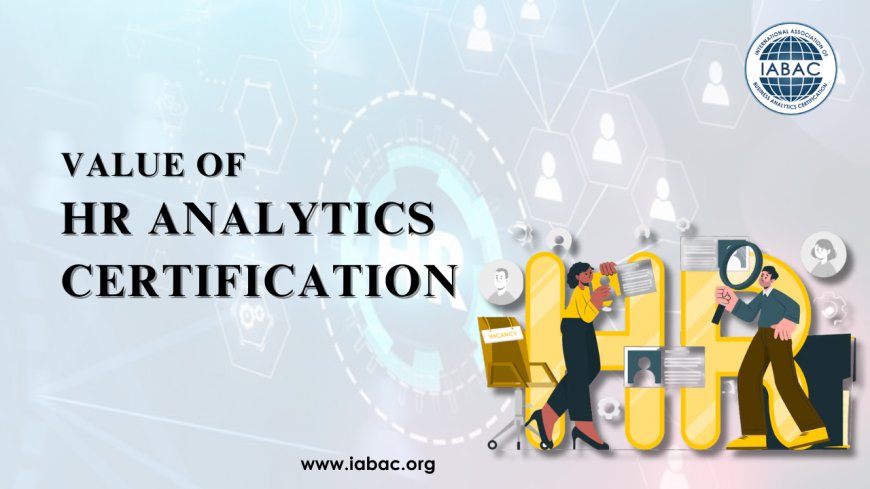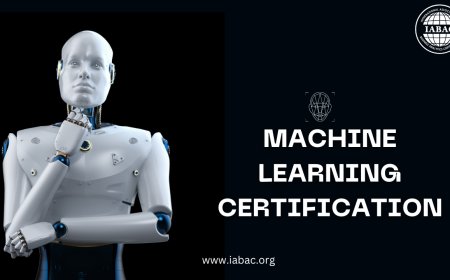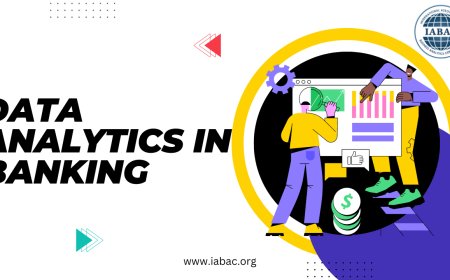The Value of HR Analytics Certification
Enhance your career with HR Analytics Certification. Learn to leverage data for strategic decisions and improve organizational performance.

HR analytics certification is really important in HR because it helps people learn how to use data well. In today's world, all kinds of businesses need to make smart decisions based on data, and HR is no different. With certification, HR professionals can learn how to analyze HR data to make things better for employees and the company.
As businesses try to stay competitive, they want HR professionals who can understand and use data effectively. HR analytics certification teaches people how to do just that—analyze data, find trends, and make smart decisions. Having this certification shows that someone knows their stuff and can make a real difference in the HR world.
What is HR Analytics Certification?
HR analytics certification is a professional credential that confirms an individual's proficiency and skills in applying data analysis techniques to human resources (HR) processes and decisions. This type of certification typically encompasses a range of topics such as statistical analysis, predictive modeling, workforce analytics, and the use of HR technology platforms. The curriculum often includes training on interpreting complex datasets, making data-driven decisions, and understanding the impact of HR metrics on organizational performance.
Significance of HR Analytics Certification
The significance of HR analytics certification in validating skills and expertise in HR data analysis includes:
1. Professional Credibility: It provides HR professionals with a formal acknowledgment of their analytical capabilities, enhancing their credibility and reputation in the field.
2. Career Advancement: Certified professionals are often seen as more competitive for advanced HR roles that require analytical skills, potentially leading to better job opportunities and career progression.
3. Improved Decision-Making: The certification equips HR professionals with the necessary tools to analyze workforce data effectively. This allows them to make informed decisions that can improve staffing, productivity, and employee satisfaction.
4. Bridging the Skills Gap: As HR evolves into a more strategic function heavily reliant on data, the certification helps professionals bridge the gap between traditional HR functions and the analytical skills needed in modern HR practices.
5. Standardization of Practices: Certification programs often teach standardized approaches to data analysis, ensuring that certified professionals are equipped with industry-recognized methods and practices.
Overall, an HR analytics. certification validates that an individual is capable of contributing significantly to the strategic management of human resources through data-driven insights. This can be crucial for organizations looking to leverage data for strategic advantage and operational improvement.
Benefits of HR Analytics Certification
Obtaining an HR analytics certification can offer a multitude of advantages that significantly impact a professional’s career in human resources. Here’s how:
1. Enhanced Career Opportunities
-
Promotion Prospects: Professionals with HR analytics certification are often considered for promotion due to their ability to make data-driven decisions that can improve HR operations and strategy.
-
Leadership Roles: Certified individuals are better positioned to take on leadership roles within HR, as they can leverage data insights to lead teams, manage projects, and influence organizational policies effectively.
-
Salary Potential: With specialized skills in HR analytics, certified professionals often have higher earning potential. Organizations may offer better compensation to individuals who can contribute to strategic decision-making through sophisticated data analysis.
2. Increased Credibility
-
Recognition from Employers: Employers recognize HR analytics certification as a testament to a professional’s commitment to maintaining and enhancing their analytical skills in HR.
-
Peers and Industry Experts: Certification can also elevate a professional's stature among peers and industry experts, marking them as knowledgeable and skilled in a highly specialized area of HR.
3. Advanced Skill Set
-
Proficiency in Data Analysis: Certification trains individuals in rigorous data analysis, helping them interpret and utilize complex data sets to address business needs.
-
Reporting: Certified professionals learn to create detailed reports that outline findings and drive organizational decisions, making them valuable assets to their teams.
-
HR Technology: Understanding and using advanced HR technology platforms is another crucial skill gained during certification. These tools are essential for analyzing large datasets and automating reports and analytics processes.
4. Practical Application
-
Solving Real-World HR Challenges: Certification prepares HR professionals to tackle real-world problems such as turnover, employee engagement, and workforce planning using data-driven insights.
-
Strategic Contribution: With advanced analytical skills, HR professionals can contribute strategically to the organization by predicting trends, planning future needs, and advising on policy based on factual data.
By enhancing their capabilities in these areas, HR professionals not only improve their career trajectories but also significantly contribute to the strategic development of their organizations. An HR analytics certification thus serves as a crucial stepping stone for HR professionals aiming to transition from traditional practices to more strategic, data-driven roles.
Types of HR Analytics Certifications
HR analytics certifications come in a variety of formats, each suited to different learning styles and career goals. Here are the primary types available:
1. Professional Organization Certifications
-
SHRM (Society for Human Resource Management): Offers certifications that cover broad HR competencies including some aspects of HR analytics.
-
HCI (Human Capital Institute): Provides more focused certifications on strategic HR practices, including analytics.
-
CIPD (Chartered Institute of Personnel and Development): Offers comprehensive HR qualifications that include modules on HR analytics, popular in the UK and internationally.
2. Online Courses and Programs
-
Coursera: Features courses and specializations in HR analytics created in collaboration with universities and colleges.
-
edX: Provides a range of courses from MicroMasters to professional certificates in HR analytics, developed by educational institutions.
-
Udemy and LinkedIn Learning: These platforms offer a variety of HR analytics courses that are flexible and self-paced.
3. In-Person Workshops and Training Sessions
-
Expert-Led Workshops: These are interactive, often intense sessions focused on applying HR analytics to real-world data, hosted by experts or universities.
-
Industry Conferences: Include specialized sessions or workshops in HR analytics, offering learning and networking opportunities.
4. Company-Sponsored Training
-
In-House Programs: Some companies provide custom HR analytics training tailored to their internal needs and systems.
Each type of certification or training offers distinct benefits, depending on what you're looking to achieve in your career. Professional organization certifications are widely recognized, online courses offer flexibility, and in-person workshops provide hands-on experience.
How to Obtain HR Analytics Certification?
To earn an HR analytics certification, follow these simple steps:
1. Research Certification Programs: Start by exploring different certifications available through professional organizations like SHRC, HCI, or CIPD, and online platforms such as Coursera or edX. Look for programs that match your career goals.
2. Assess Your Skills and Goals: Evaluate your current skill level and determine what you want to achieve through the certification. This will help you choose a program that's right for your needs.
3. Register for a Program: Once you've chosen a certification program, go ahead and register for it. Make sure to note any registration deadlines and fees.
4. Complete the Coursework: Attend all sessions, complete any required assignments, and engage with any practical components of the course to gain hands-on experience.
5. Prepare for Exams: If your certification requires passing an exam, prepare by reviewing course materials and taking practice tests if available.
By following these steps, you can successfully obtain an HR analytics certification and advance your understanding and application of HR data analysis.
Barriers to HR Analytics Certification
Pursuing an HR analytics certification can be challenging due to several factors:
1. Cost: Certification programs can be expensive, incorporating fees for courses, exams, and sometimes required memberships.
2. Time Commitment: These certifications demand significant time for coursework, study, and assessments, which can be tough to manage alongside work and personal life.
3. Technical Skills: HR analytics often requires strong statistical skills and familiarity with specific software, which can be a barrier for those without a technical background.
4. Access to Training: Not everyone has easy access to high-quality training, particularly in less urban areas, although online programs are helping bridge this gap.
5. Keeping Up to Date: The field of HR analytics is rapidly evolving, and staying current with new technologies and methods can be demanding.
HR analytics certification is a great way to boost your career and credibility in human resources. Although it can be costly and time-consuming, and requires some technical skills, the benefits are worth it. With this certification, you can access better job opportunities, earn more, and make smart, data-driven decisions at work. If you're looking to advance in HR, getting certified in HR data analysis could open up new opportunities and help you stand out in your field.











































